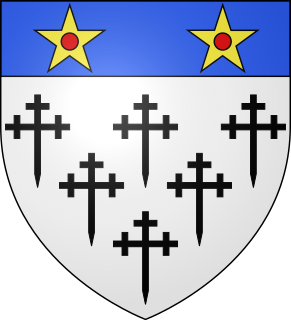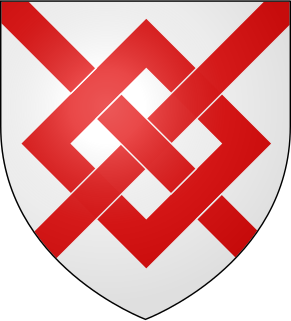
Clinton is an English noble surname, indicating one's ancestors came from English places called Glympton or Glinton. Clinton has frequently been used as a given name since the late 19th century. Baron Clinton is a title of peerage in England, originally created in 1298.

Stepney is a district in East London in the London Borough of Tower Hamlets that grew out of a medieval village around St Dunstan's church and the 15th-century ribbon development of Mile End Road called Stepney Green. The area built up rapidly in the 19th century, mainly to accommodate immigrant workers and displaced London poor, and developed a reputation for poverty, overcrowding, violence and political dissent. It was severely damaged during the Blitz, with over a third of housing totally destroyed; and then, in the 1960s, slum clearance and development replaced most residential streets with tower blocks and modern housing estates. Some Georgian architecture and Victorian era terraced housing survive in patches: for example Arbour Square, the eastern side of Stepney Green, and the streets around Matlock Street.

Blake is a surname or a given name which originated from Old English. Its derivation is uncertain; it could come from "blac", a nickname for someone who had dark hair or skin, or from "blaac", a nickname for someone with pale hair or skin. Another theory is that it is a corruption of "Ap Lake", meaning "Son of Lake".

Clark is an English language surname, ultimately derived from the Latin clericus meaning "scribe", "secretary" or a scholar within a religious order, referring to someone who was educated. Clark evolved from "clerk". First records of the name are found in 12th-century England. The name has many variants.
Bradley is an English surname derived from a place name meaning "broad wood" or "broad meadow" in Old English.
The surname Newman may refer to many people:
Davies is a patronymic Welsh surname. It may be a corruption of Dyfed, itself a corruption of Dési, colonists from south-east Ireland who occupied the old tribal area of the Demetae in south-west Wales in the late third century AD, establishing a dynasty which lasted five centuries. Dyfed is recorded as a surname as late as the 12th century for e.g. Gwynfard Dyfed, born in 1175. 'Dafydd' appears as a given name in the 13th Century, e.g. Dafydd ap Gruffydd (1238–1283), Prince of Wales, and Dafydd ab Edmwnd, Welsh poet. The given name 'Dafydd' is generally translated into English as 'David'. Alternatively it may derive from David, the name of Wales's patron saint. In Wales Davies is standardly pronounced DAY-vis, that is, identically to Davis. This pronunciation is also used by many outside the United Kingdom, where it competes with the spelling pronunciation DAY-veez, which is particularly common in the US.

The surname Cox is of English or Welsh origin, and may have originated independently in several places in Great Britain, with the variations arriving at a standard spelling only later. There are also two native Irish surnames which were anglicised into Cox.
Bell is a surname common in English speaking countries with several word-origins.
Yeo is a Chinese, English, and Korean surname.
Courtney is of Old French origin, introduced into England after the Norman Conquest of 1066. It has two quite distinct interpretations: firstly, the surname may be locational, from places called Courtenay in the regions of Loiret and Gâtinais. The House of Courtenay was a significant French family with close association with both the French, and thereby, English royal lines; in England the Courtenays were Earls of Devon.
Hughes is an Anglicized spelling of the Welsh and Irish patronymic surname of French origin. The surname may also be the etymologically unrelated Picard variant "Hugh" of the Germanic name "Hugo".
Williamson is a common English language patronymic surname meaning "son of William". Williamson is uncommon as a first name, but quite common as a surname in English speaking countries.
Harrison is a common patronymic surname of English origin. It may also be spelled Harrisson, Harryson or Harrysson. Harrison means "son of Harry". Early records suggest that the surnames Harrison and Harris were used interchangeably by some families. Harrison is the 42nd most common surname in England and 123rd most common in the United States. The first known recording of the surname had been dated from 1355 in London, England.
Norman is both a surname and a given name. The surname has multiple origins including English, Irish, Scottish, German, Norwegian, Ashkenazi Jewish and Jewish American. The given name Norman is mostly of English origin, though in some cases it can be an Anglicised form of a Scottish Gaelic personal name.
Thompson is a patronymic surname of English and Scottish origin, with a variety of spellings, meaning "son of Thom". An alternative origin may be geographical, arising from the placename Thompson. Thom(p)son is the English translation of MacTavish, which is the Anglicised version of the Gaelic name of MacTamhais. During the Plantation period, settlers carried the name to Ireland. It is the 14th most common surname in the United Kingdom and 23rd most common in the United States. According to the 2010 United States Census, Thompson was the 23rd most frequently reported surname, accounting for 0.23% of the population.
Sheridan is an Anglicized version of the Irish surname O'Sirideáin, originating in Co Longford, Ireland. In Irish Gaelic, it means son of Sheridan.
Every is a surname. Eber or Ivri was the descendent of Noah's son Shem and the ancestor of Abraham. In modern Hebrew, Évry is actually the word for "Hebrew". Eber's name is found on some of the earliest known examples of Sumerian writing. It may be of Norman origin and derived from "Évreux", a county in Normandy. The Every baronets of Egginton, a branch of the Every family of southwest England, are claimed to be a branch of the noble house of Yvery, of Norman extraction. The earliest surviving records of the name "Every" date to 12 April 1591, when one John Every married Elizabeth Ouzely at St Dunstan's, Stepney.
Clarke is an Anglo-Irish surname which means "clerk". The surname is of English and Irish origin but the original word comes from Latin for clericus. There are some surname variants, including the Clerk and Clark which predates Clarke by over 700 years. Clarke is also uncommonly chosen as a given name.







